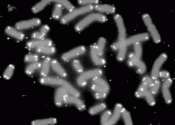Shorter telomeres point to increased Alzheimer's risk
Short telomeres in midlife are associated with a higher risk of developing Alzheimer's disease, UConn School of Medicine researchers report in the May 30 issue of Aging Cell.
Jun 28, 2023
0
42
Short telomeres in midlife are associated with a higher risk of developing Alzheimer's disease, UConn School of Medicine researchers report in the May 30 issue of Aging Cell.
Jun 28, 2023
0
42

No one likes the thought of getting old, but it seems to be an inevitable part of life. Most species grow, develop and repair damage to their bodies until a certain point in adulthood. After this, the body becomes less capable ...
Sep 20, 2022
0
17

SARS-CoV-2 causes the pandemic coronavirus disease COVID-19, that is more harmful for elderly people, who show more severe symptoms and are at higher risk of hospitalization and death. A group of Italian and American researchers ...
Dec 3, 2021
0
37

A large cohort study conducted by the Faculty of Medicine at The Chinese University of Hong Kong (CU Medicine), in collaboration with investigators from the University of Sydney, Australia, has discovered that shortened DNA ...
Aug 11, 2020
0
2

A recent study by George Mason University researchers in the Department of Global and Community Health found that women who have given birth have shorter telomeres compared to women who have not given birth. Telomeres are ...
Mar 8, 2018
0
82

(HealthDay)—The more you booze it up, the more your cells age, increasing your risk for age-related health problems like heart disease, diabetes, cancer and dementia, a new study suggests.
Jun 26, 2017
1
26

Children and teens exposed to high levels of traffic-related air pollution have evidence of a specific type of DNA damage called telomere shortening, reports a study in the May Journal of Occupational and Environmental Medicine.
May 24, 2017
0
13

When it comes to genes associated with cancer, none have been studied more extensively than p53, a tumor suppressor gene that serves as the guardian of our genetic information. More than half of all cancers have mutations ...
Jan 15, 2016
0
12

Scientists from A*STAR's Institute of Medical Biology (IMB) have successfully established a comprehensive model of rare accelerated ageing syndrome Hutchinson-Gilford Progeria Syndrome (HGPS), thereby opening up the possibility ...
Sep 23, 2015
0
28

Studying telomeres, the structures that protect the ends of chromosomes, has become a key issue in biology. In recent years, not only has their relation to ageing been confirmed; defective telomeres seem to be linked to more ...
Jul 15, 2015
0
70
